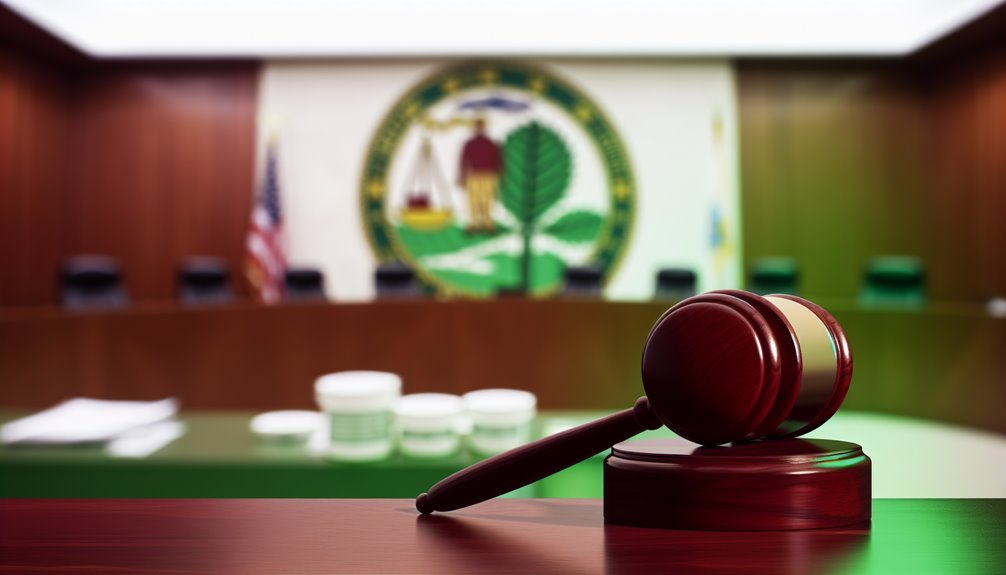As you navigate the evolving landscape of medical marijuana legislation, it's important to highlight the recent landmark ruling in Nebraska. Lancaster County District Judge Susan Strong dismissed a lawsuit challenging signature petitions for Initiatives 437 and 438, affirming their constitutional and statutory validity. This decision, now under review by the Nebraska Supreme Court, could set a precedent for the establishment of the Nebraska Medical Cannabis Commission. Ever wondered what this could mean for Nebraska's journey toward legalizing medical marijuana by 2025? Let's explore this together.
Understanding the Nebraska Judge's Landmark Ruling on Medical Marijuana

While you may be familiar with the broader debate on medical marijuana, understanding the intricacies of the recent Nebraska Judge's ruling requires an exploration into the details. Lancaster County District Judge Susan Strong dismissed a lawsuit questioning the signature validity of medical marijuana initiatives. Despite arguments that many signatures were invalid, Judge Strong concluded that the petitions met all constitutional and statutory requirements under Nebraska law. The legal implications are significant; the case now rests with the Nebraska Supreme Court. Should the ruling stand, the path for implementing medical marijuana in Nebraska becomes clearer, in spite of conflicting federal regulations. Additionally, the Nebraska Medical Cannabis Commission is tasked with establishing licensing criteria by July 1, setting the stage for potential medical marijuana dispensaries to operate by October 1. Nebraska Medical Cannabis Commission It's a complex issue, but one that's critical to understanding the scope and limits of state autonomy on medical marijuana.
Assessing the Potential Health Benefits of Medical Marijuana
In light of the Nebraska Judge's ruling and the potential for expanded access to medical marijuana in the state, it's worth exploring the potential health benefits associated with its use. Medical marijuana is found to modestly reduce pain in conditions like nerve damage and cancer, providing a safer alternative to opioids. You'll find that cannabinoids, especially when combined with terpenes, can enhance pain relief effectively. Additionally, it's known to reduce anxiety, offering relief to those with social anxiety disorder and PTSD. The benefits extend to improved sleep quality and appetite increase in HIV and AIDS patients. It's also important to note that it can control vomiting in chemotherapy patients, proving its versatility in addressing various health concerns. Moreover, a study by Johns Hopkins Medicine and Realm of Caring Foundation revealed that medical marijuana users reported an 8% better quality of life compared to non-users, indicating its overall positive impact on health.
A Brief History of Medical Marijuana Legislation in Nebraska

Although Nebraska's stance on marijuana dates back to 1969 when penalties for possession were eased, it's the more recent efforts that truly shape the state's current medical marijuana landscape. You can trace the state's medical history and legislative timeline to 1979 when Nebraska decriminalized first-time possession. Several attempts to legalize medical marijuana failed until the landmark 2024 Measures 437 and 438. These measures, despite legal challenges, were upheld by a District Court judge and transformed the state's approach to medical marijuana. Now, the Nebraska Medical Cannabis Commission is set to regulate the sector, with medical cannabis businesses expected to open by 2026. This journey reflects Nebraska's evolving attitude on medical marijuana, moving from strict enforcement to a more compassionate stance.
Comparing Nebraska's Stance to Other States on Medical Marijuana
As we move from Nebraska's historical stance on medical marijuana to how it compares with other states, it's clear that the Cornhusker State is part of a broader national trend. As the 39th state to legalize medical marijuana, Nebraska is in line with many red states that have also legalized. State comparisons reveal regulatory differences, with Nebraska's framework involving the creation of a dedicated Medical Cannabis Commission. It's crucial to recognize, however, that regulations vary, with states like Colorado offering more extensive frameworks. Access to medical cannabis also differs across states, with Nebraska allowing up to five ounces for qualified patients. Despite the progressive state laws, the federal illegality of marijuana creates ongoing legal challenges for states like Nebraska.
The Role of Public Opinion in Shaping Marijuana Legislation

Public opinion plays a pivotal role in shaping marijuana legislation. Your understanding of this public perception is essential in legislative influence. With a reported 70% of U.S. adults favoring legalization, it's clear this is a pressing issue. This support spans all political groups and is inversely correlated with age. Reasons for backing legalization often include the belief that marijuana is less harmful than other substances, potential medical benefits, and the prospect of tax revenue. Opposition stems from concerns over health risks, potential crime rates increase, and perceived lack of control. Political party affiliation, age, and regional differences notably sway opinions. Legislation isn't created in a vacuum; it's molded by public sentiment, with each voice contributing to the dialogue.
Analyzing the Economic Impact of Legalizing Medical Marijuana in Nebraska
Given these facts, it's clear that legalizing medical marijuana in Nebraska could have far-reaching economic impacts. This move could spur economic growth and increase tax revenue, greatly boosting the state's economy.
- Economic growth: With over $925 million in projected economic activity by 2030 and annual sales expected to exceed $152 million, the industry is poised for rapid growth.
- Job creation: The industry could support local workers and businesses, creating new job opportunities and driving local spending.
- Tax revenue: The regulated medical cannabis market could contribute to increased tax revenue, aiding community development and further supporting economic growth.
In serving others, you should consider the potential benefits of this sector, the ripple effects it could have on the community, and the role it could play in Nebraska's economic future.
The Potential Challenges and Controversies Surrounding Medical Marijuana Legalization

While the potential economic benefits of legalizing medical marijuana in Nebraska are significant, it is crucial to also address the numerous challenges and controversies that come along with this decision. You must consider health risks such as respiratory problems and mental illness related to chronic use. Legal complexities, including federal law contradictions and regulatory discrepancies between state and federal levels, complicate the issue further. The lack of FDA approval and restrictive federal scheduling add to these challenges. Research on cannabis health effects is hindered by inadequate funding and methodological difficulties. Social implications, like increased use among youth and the impact on the criminal justice system, can't be ignored. Finally, there are public health concerns due to insufficient research and potential strengthening of black market operations.
Insights From Medical Experts on the Medicinal Use of Marijuana
Amid the challenges and controversies surrounding medical marijuana legalization, it's important to understand the viewpoints of medical experts on its use. They believe in its medical benefits for conditions like chronic pain, nausea, and epilepsy, supported by substantial evidence.
- Chronic Pain: Experts find marijuana effective in managing pain, especially in conditions like multiple sclerosis and rheumatoid arthritis.
- Epilepsy: They applaud the FDA's approval of Epidiolex, a purified CBD medication for rare seizure disorders.
- Nausea and Vomiting: They recognize its ability to control nausea and vomiting induced by cancer chemotherapy.
Though research is limited by federal law, experts stress the need for continued studies to optimize its therapeutic applications while ensuring patient safety. Their opinions are crucial in shaping the future of medical marijuana.
Future Outlook: The Path Towards Full Legalization of Medical Marijuana in Nebraska

In your quest to understand the path towards full legalization of medical marijuana in Nebraska, it is important to grasp the legal framework and its implementation. The recent approval of Initiatives 437 and 438, along with Governor Pillen's proclamation, suggest a positive trajectory towards patient access. However, looming legal challenges by former state senator John Kuehn add a layer of uncertainty. Despite this, the Nebraska Medical Cannabis Commission is set to roll out future regulations by July 2025 and start granting business licenses by October 2025. Patient protections are also in place, allowing legal possession of cannabis upon a healthcare provider's recommendation. Yet, it is important to acknowledge that the full realization of these policies may take until 2026 due to ongoing litigation.
Conclusion
As the dust settles on Judge Susan Strong's historic ruling, you're likely seeing Nebraska inch closer to legalizing medical marijuana. It's not a walk in the park, with economic, health, and social impacts to contemplate. But, as public opinion sways and potential health benefits come to light, the Cornhusker State could join the green wave by 2025. Hold onto your hats, folks. The journey towards full legalization will be a fascinating ride.
If you're curious about the benefits of medical marijuana and how it could help, I invite you to check out Fells Point Cannabis Docs of Maryland. They have a wealth of information and can guide you through the process. You can visit them in person or simply give them a call at (410) 401-4200. They're friendly and ready to answer any questions you may have. Let's explore this exciting journey together!
